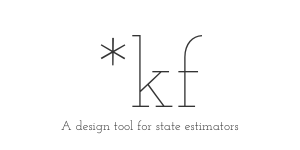udfactor
Factors a positive semi-definite matrix, A, into an
upper-unitriangular matrix, U, and diagonal matrix with elements in d
such that:
U * diag(d) * U.' == AThis function is nearly identical to ldfactor. See that function for
more.
Inputs
A | Positive, semi-definite matrix |
|---|---|
tol | Division tolerance; when divisors are below this value, no division will actually take place. |
Outputs
U | Upper unitriangular matrix |
|---|---|
d | Vector of diagonals |
nz | Number of zero diagonals found during factorization |
Example
Generate a random covariance matrix.
Break it down to U and d.
P = randcov(3)
[U, d] = udfactor(P)P =
0.5052 -0.2311 -0.2059
-0.2311 0.5124 -0.0714
-0.2059 -0.0714 0.7502
U =
1.0000 -0.4959 -0.2744
0 1.0000 -0.0951
0 0 1.0000
d =
0.3243
0.5056
0.7502Reconstruct the original matrix
U * diag(d) * U.'ans =
0.5052 -0.2311 -0.2059
-0.2311 0.5124 -0.0714
-0.2059 -0.0714 0.7502Reference
Stengel, Robert F. Optimal Control and Estimation. New York: Dover Publications, Inc. 1994. Print. Page 360.
See Also
ldfactor, ld2mat, ud2mat, sqrtpsdm
*kf v1.0.3 January 17th, 2025
©2025 An Uncommon Lab
